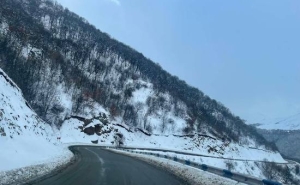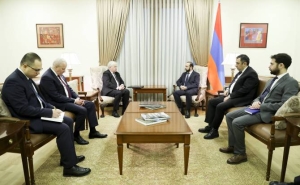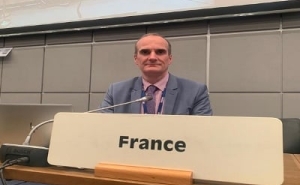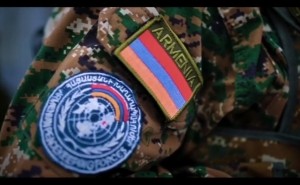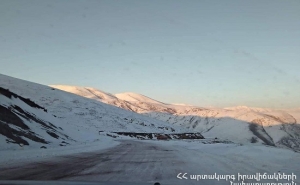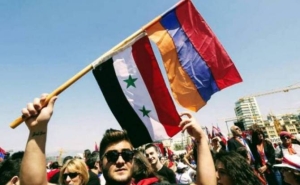Armen Ashotyan: The Challenges Parliament Faces in Foreign Policy Sphere are Being Solved (EXCLUSIVE)
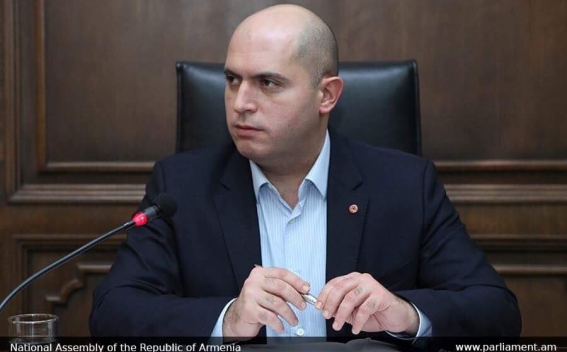
"Armedia" IAA presents an exclusive interview with the Chairman of the Standing Committee on Foreign Relations of the National Assembly of the Republic of Armenia, Deputy Chairman of the Republican Party Armen Ashotyan.
- Mr. Ashotyan, in his address to the National Assembly of the 6th convocation, the President of Armenia emphasized the importance of introducing the principles for increasing the effectiveness of parliamentary diplomacy. What activities have been carried out in this direction so far and in that context what further steps are planned for 2018?
- Of course, on the way to parliamentary republic, parliament's involvement in external relations, international agenda and Armenia's foreign policy will increase. In addition to the traditional tools that have sectoral commissions, the parliament generally executes parliamentary oversight (question-and-answer, budget reports, etc.), there is also the content side of the issue, and our commission, which has always been distinguished by its active participation in all the National Assembly convocations, will take on the functions of forming the parliamentary diplomacy, creating the analytical capacity.
First, in terms of organizational meaning, new procedures have been set up for inter-parliamentary delegations, committees, and friendship groups. Now more initiative and diligence are required from all the MPs involved in the process. Parliamentary delegations, members of friendship groups have been updated, parliamentary diplomacy is implemented at various levels through the Speaker of the National Assembly, the Committees, Delegations, Friendship groups, and factions. That is to say, we have multilayer opportunities and it is very important to work together in this direction. And it is the Standing Committee on Foreign Relations that is responsible for the coordination of all this.
Last year Analytical Council was created by the decision of our committee in order to further strengthen the capacity of parliamentary diplomacy. The Council involves the best, progressive and well-educated political experts, analysts, regional specialists in Armenia. We feel the results of our work. This Council creates content for us.
The work should, of course, be a long-term one. At this stage, I can state that the problems the parliament faces in the foreign policy sphere are solved , and it is noteworthy that not only the increased intensity of mutual visits proves this fact, but also the political content reflected in various resolutions, statements and so on. The national and state interests of Armenia are best represented in those resolutions at all levels. Of course, this is a process that does not have an end, and needs constant improvement, correction of mistakes, generation of new ideas, and the commission has taken this key role and has a certain responsibility for coordination and co-operation at all levels. I think this parliament has all the capabilities to best represent Armenia and the people of Armenia abroad.
- What were the key achievements and omissions of the parliamentary diplomacy in 2017?
- I do not like to answer this question. I just want to point out that the advantage is that we have new opportunities as a parliament that will function within the framework of new parliamentary republic under the new Constitution. Problems arise from the fact that it is the first time we work with this system of management. We all need to understand this, to change the environment so that we can benefit from the advantages of the parliamentary governance model, including the foreign policy.
Parliamentary diplomacy has a number of advantages over the policy pursued by the executive, because it is more representative, more liberal as it represents different political forces and more public. We are not just mechanical reproducers of the views of the executive body, we are a body with the ability and mechanisms to influence these views and decisions, first of all through intellectual work, so parliamentary diplomacy does not come to react or repeat the views of the executive power, it comes to enrich and strengthen the levers given to the executive body and to implement a certain policy.
- What are the main directions of work for the 2018?
- We have traditional directions: it is our Eurasian or Russian direction, the manifestations of which is numerous - the bilateral relations with the two chambers of the Russian Federation, the CSTO, the Eurasian and the CIS formats. Of course, we have a European, Atlantic direction, which includes relations with the European Parliament, relations with the Council of Europe structures, NATO, OSCE and others. We also have a desire to work more actively with Asian countries, especially with the Muslim world, but not only. Therefore, in 2018, we will develop traditional relations, create new political relationships, open new horizons. We have 59 friendship groups which potential has not been used well yet.
- Mr. Ashotyan, you talked about the Analytical Council founded in 2017, which seems to have created a new political culture. What further plans are there regarding the Council?
- When the Analytical Council was formed, the pessimists said that the council would not succeed as the experts would not work for free, or the parliament would not need it. However these 8 months have proven that this is not the case.
We want to work and I am grateful to dozens of experts who are ready to work on a public, voluntary basis for the crystallization of national interests. We have convened several sessions and more sessions will be held this year, too. As a result of these sessions, analytical references are prepared that are circulated within narrow circles (within the political elite and in Artsakh as well).
The Analytical Council has also opened interesting prospects for internationalization, as a number of embassies are highly interested in meetings of this council, they come, attend, express willingness to cooperate. Such interests have been expressed from the United States, Russia, China and the EU.
This year, of course, it would be good if we could find some extra-budgetary resources to cover organizational expenses of the Council. For example, I would like to have an internal analytical Internet portal that would allow you to combine the results, articles, publications, the works of the Council experts. I also want to have formats of outgoing sessions and joint sessions. There is also a desire to initiate a publication of a collection of annual political articles. I think the parliament needs it, and if in the first half of this year I manage to carry out organizational work with positive results, then in the second half of the year, I think, we will be witnessing another interesting initiative. Under the aegis of the NA Standing Committee on Foreign Relations, we will have the so-called analytical and political yearbook, where the most interesting articles of our best experts will be printed.
-
 17:08
17:08The regular session of the Anti-corruption Policy Council takes place in Jermuk
-
 15:05
15:05The Prime Minister sends congratulatory messages to the supreme leader of Iran and the President of Iran
-
 11:11
11:11Armenia sends earthquake aid to Turkey
-
 10:43
10:43Commemoration of the Pontiff St. Sahak Partev
-
 09:16
09:16Some roads are closed and difficult to pass in Armenia
-
 19:55
19:55Phone conversation of the Foreign Minister of Armenia with the U.S. Assistant Secretary of State for European and Eurasian Affairs
-
 18:30
18:30Prime Minister Pashinyan and President Khachaturyan meet
-
 18:20
18:20Ararat Mirzoyan with Co-Chairman of the OSCE Minsk Group of France Brice Roquefeuil
-
 17:01
17:01Humans could land on Mars within 10 years, Musk predicts
-
 16:45
16:45France, US urge 'immediate' end to Nagorno Karabakh blockade
-
 16:01
16:01Blockaded Nagorno Karabakh launches fundraiser to support quake-hit Syria
-
 15:59
15:59Earthquake death toll in Turkey rises to 18,342
-
 15:43
15:43Ararat Mirzoyan Held a Telephone Conversation with Sergey Lavrov
-
 15:06
15:06French president rules out fighter jet supplies to Ukraine in near future
-
 14:47
14:475 Day Weather Forecast in Armenia
-
 14:44
14:44President Vahagn Khachaturyan wrote a note in the book of condolences opened in the Embassy of Syria in Armenia
-
 14:20
14:20Azerbaijan’s provocations impede establishment of peace and stability – Armenian FM tells Russian Co-Chair of OSCE MG
-
 12:57
12:57France representation to OSCE: Paris calls on Azerbaijan to restore freedom of movement through Lachin corridor
-
 11:40
11:40Command of Kosovo forces highly appreciated preparation of Armenian peacekeepers
-
 10:16
10:16The United States withdrew from sanctions against Syria for six months the provision of assistance after the earthquake
day
week
month
Humidity: 32%
Wind: 3.09 km/h


